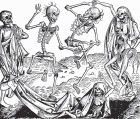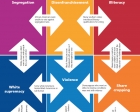Society
How people group together, organise their rules and systems are all part of what create a society. In this section articles examine the nature of society how it interacts with other themes of culture, power, etc. and how societies have developed and changed over time. The structures of the ancient world are explored as are the complex feudal systems and the varied societies of Empire and modernity.
Sort by:
Date (Newest first) | Title A-Z
Show:
All |
Articles |
Podcasts |
Multipage Articles
-

What Have Historians Been Arguing About... the long-term impact of the Black Death on English towns
ArticleClick to view -

What Have Historians Been Arguing About... youth culture?
ArticleClick to view -

Whose past is it anyway? Telling Russian and Soviet history through diverse Jewish voices
ArticleClick to view -

Women, education and literacy in Tudor and Stuart England
ArticleClick to view -

‘Its ultimate pattern was greater than its parts’
ArticleClick to view

